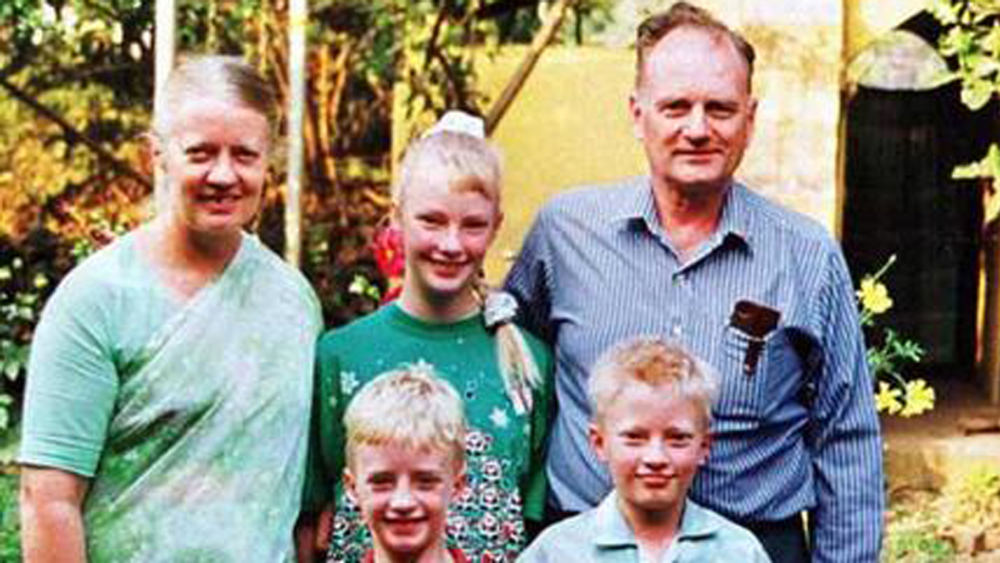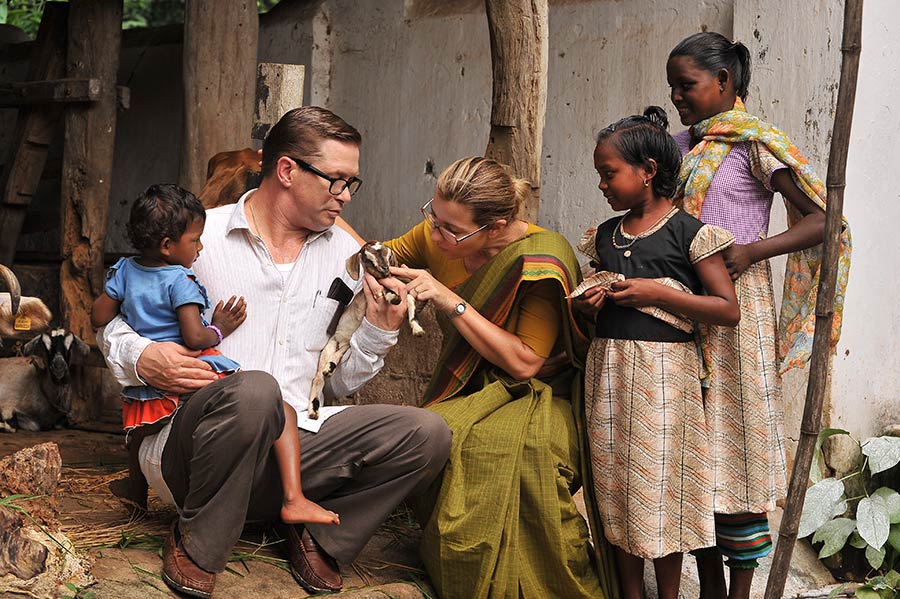Staines family tragedy becomes movie
Indian missionary revisits husband and sons’ murder
“I’m getting a bit tired but, apart from that, I’m OK,” says Gladys Staines, the wife of Australian missionary Graham Staines, who was murdered in India in 1999.
She does sound worn out and is evidently struggling with the spotlight being upon her.
Opening this week in cinemas across Australia, The Least of These is a major new movie revolving around the killing of Gladys’ husband and two sons, Philip (10) and Timothy (6), when the Staines worked with people affected by leprosy.
The movie was made in consultation with Gladys but her humble support for it is evidently taking its toll.
“Journalists were surprised when I stated that I had forgiven them.” – Gladys Staines
Facing a couple of days of interviews, as well as travel to Sydney to attend another premiere – she attended The Least of These’s Queensland premiere in Maroochydore the night before our interview – Gladys doesn’t pretend this media stuff is easy or glamorous. She has a real life going on outside the movie’s release, yet her intimate involvement with what’s on screen has drawn her into its orbit.
While that may come as no surprise to readers, Gladys has often shocked the world with her response to Hindu extremists burning alive her sons and husband – a missionary working at a leprosy home in Baripada, in the northern Indian state of Odisha.
As you can probably imagine, people from all over the world are flabbergasted that she hasn’t ditched her Christian faith. “When people ask me why I haven’t left my faith – why would I leave Jesus Christ, who has been my helper and sustainer? It’s not about walking away from your faith, because it’s just not,” says Gladys, who met Graham in India and also served people affected by leprosy.
Holding tight to Jesus for the past 20 years is one thing. Another was Gladys’ shocking display in the immediate aftermath of the tragedy that took place on January 22, 1999, when Graham and their boys were set upon in the middle of the night by a mob that torched the jeep they were sleeping in. The Staines men were attending a Christian camp in a village several hours from their Baripada home. Gladys and daughter Esther had not accompanied them on the camp.
In the first 24 hours after the murders, Gladys faced a media onslaught when she declared she had already forgiven the people who were responsible for her husband and son’s deaths, even though their identities were unknown at that point. (Later, Indian man Dara Singh was convicted of the murders).
“As the news broke across India and the media came to my doorstep, the journalists were surprised when I stated that I had forgiven them. I answered that I wasn’t angry; I was sad.”
“Journalists asked me, ‘How could I forgive?’ I told them Jesus has forgiven me from my sins, he taught us to forgive others, and he enabled me to forgive.
“Within 24 hours, I was also asked: ‘What is your message to the people of India?’ I wanted people to know that Jesus forgives, that God loves them, and he wants them to know Him,” she explains. “This message did not stay in India but made its way to Australia and all around the world.”
Twenty years later, Gladys describes the process of healing and dealing with such loss as one that is ongoing. But when she reflects on the time when she held the world’s gaze, she’s not amazed at how she reacted. “I’m thankful that God gave me those words to say.”
“I’m not shocked by my immediate response and over the years, I have worked through a process of forgiveness,” shares Gladys, who stayed in India for another five years, working at the home for people affected by leprosy.
In 2015, Gladys was recognised with the revered Mother Teresa Memorial Award for Social Justice.
Gladys was first approached by writer Andrew Matthews about making a movie about the Staines family in 2004. “It wasn’t something I was all excited about, particularly, but it was something I did because I thought it was OK to do it. It probably created a bit of stress for me, in a sense, just not knowing what was going to happen or how it would be.”
Gladys trusted Matthews, and in particular his reason for making what eventually became The Least of These – “to encourage Christians in persecution” – something she hopes the movie does. Having had input and feedback into scripts, storyboards and final edits – especially when it came to the facts involved – Gladys feels the version now screening at Australian cinemas is the best iteration of this movie project.
“It was strange for me to hear Graham use unfamiliar words but I thought the movie captured his heart for serving God and loving the people of India,” says Gladys. Graham Staines is played by actor Stephen Baldwin (The Usual Suspects), who is well know as the brother of actor Alec (30 Rock) and a prominent adult Christian convert.
“My part was much smaller, of course, but I think Shari Rigby did a very good job of trying to be me.”
“It was Graham’s desire that people come to know Christ and it was his greatest prayer.” – Gladys Staines
The Least of These does represent the Staines men, according to Gladys and her family, although she isn’t able to fully explain why. She says that the emotional rawness of seeing the movie hasn’t overwhelmed her. She’s even had moments of viewing The Least of These when it seemed like just a movie to her, rather than the story of her own painful family history and the Staines’ impact upon India.
“The whole of India was shocked and hence the whole of India supported me,” describes Gladys about the response she got following the 1999 murders. Hundreds of people visited Gladys and Esther to share in their grief. “That’s the Indian way of doing it. You don’t leave people sitting in the grief themselves.”
More than that, Gladys still feels the strength, comfort and empowerment of people in India – and the rest of the world – praying for her and Esther. “There are still many all around the world who continue to pray for us. We sometimes wonder how would we be if there weren’t people praying for us.”
As The Least of These presents audiences with something of Graham’s life and motivation, Gladys believes his legacy resides in the hope he revealed to people, irrespective of their standing in society.
“As a result of his death, many hundreds – and maybe thousands – of people have come to a knowledge of who Jesus Christ is as their own personal saviour. Even within India, I know there were many people who were challenged by Graham having come from Australia to India to tell them about Jesus.”
“People have been pointed to Christ. It was his desire that people come to know Christ and it was his greatest prayer.”


